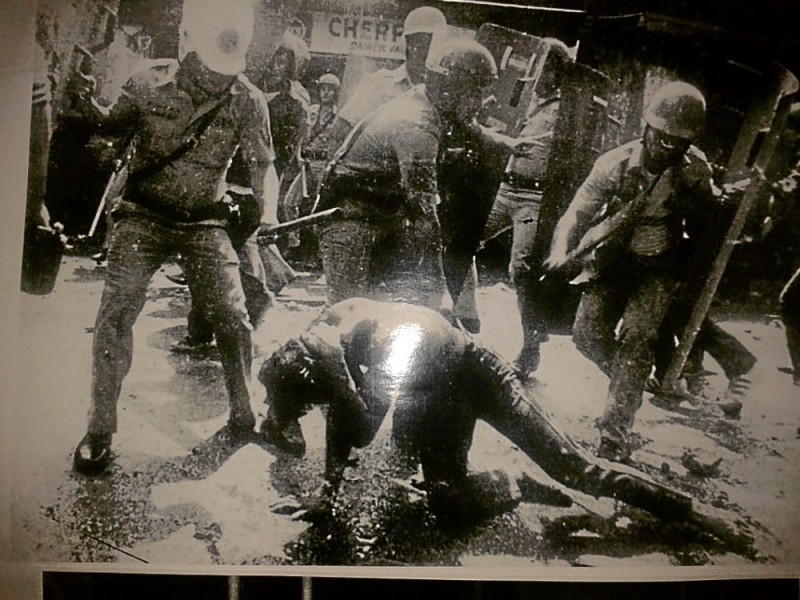
THIS PHOTO of police brutality on protesters is among those displayed in the exhibit, “Himagsik at Protesta,” put up by Karapatan at the University of the Philippines Library until Sept. 21 for the 40th anniversary of the declaration of martial rule. PHOTO REPRODUCTION BY TONETTE OREJAS
In the run-up to the 31st anniversary of the Edsa People Power Revolution, the view that history is an ongoing narrative and the fight to win the “war on memory” continues is an apt reminder to the old and young alike.
The reminder came from Jo-ed Tirol, a history professor at Ateneo de Manila University, during his talk at the launch on Tuesday evening of a new edition of “The Conjugal Dictatorship of Ferdinand and Imelda Marcos”—the tell-all book of Marcos propagandist-turned-whistle-blower Primitivo Mijares.
First published in 1976, the book details Mijares’ time as Marcos’ media confidante until he defected in 1975, having come to realize, with the imposition of martial law, that the Marcos regime had been orchestrated to keep the then first family in power.
Mijares had ended up testifying against the Marcos regime’s and the first couple’s lies, plunder, corruption, excesses and rights violations in a US congressional inquiry, despite attempts by the strongman to bribe him into silence.
In 1977, a year after the publication of the book, Mijares disappeared, believed to have become a victim of enforced disappearance. In the same year, his youngest son, Boyet, was kidnapped, tortured and killed.
This is the “social memory” that needs to be propagated, according to Tirol, because memory is “malleable.”
Two wars
“What we have is two wars in this country. One is the war on drugs but the bigger, long-term one is the war on memory. It is a terrible war on memory,” Tirol said, citing, as an example, online comments that dismiss the relaunch of Mijares’ book as nothing but political propaganda.
“It is that kind of war on memory and if we lose, the consequences are more grave than if we lose the drug war. If you create one ignorant generation, what will the next generation be like? How can you teach children if parents do not know or refuse to talk about it?” he said.
“Do not reduce martial law into a ‘thingy.’ Neither should you reduce martial law into a dichotomy …. This is not about Aquino versus Marcos. This is about truths and lies …. Which side do you want? In a war like this, there is nothing in between.”
Know the truth
Tirol reminded the youth to never stop talking. “If you keep your mouth shut, someone else will fill the void. Someone else will invent a memory …. History is about narrative. It’s an ongoing narrative, an ongoing discourse. If you do not know the truth, you cannot discourse. If you don’t tell the truth, people up there who claim the truth will come in and win that discourse.”
He urged them to take back the stories. “Do not let anyone else tell the story, especially if it’s not our story, but a myth …. If you read certain books by certain Marcos apologists, those are myths. But the minute you do not read what you should read, you let the myth win. The myth will become history even if you don’t quite believe it.”
Mijares grandson
“Our narrative, our voice, which we should never let anyone take away. That is why we rally in the streets …. [it] is not just for us. We’re there for [those] who are not on the streets, too. We are trying to form stories encouraging you—because we are trying to tell our collective story,” Tirol added.
Mijares’ youngest grandson, 19-year-old Joseph Christopher “JC” Mijares-Gurango, the primary force behind the relaunch of “The Conjugal Dictatorship,” said the “misinformation” surrounding the martial law era was intentional.
“There is a very obvious initiative to whitewash and revise that part of our history so that [it] would be more favorable to the Marcos family,” JC said in his speech at the book’s relaunch at Bantayog ng mga Bayani in Quezon City.
JC pointed out that in schools, either the martial law era was not discussed or was discussed in such a way that it was “debatable” whether it was good or bad.
This was why, JC said, his grandfather’s book was crucial for being “the only one of its kind”—an insider’s account of the dictator’s excesses.
“If we have something like this, an insider’s account of someone who was close to the Marcos family, whose credentials are easily verified, whose claims could be easily verified, surely that knowledge could arm people in a way that they haven’t been armed before.”
He said it was important that people are armed with facts, figures and knowledge in fighting misinformation “[b]ecause we’re going to lose if we try to fight them [Marcoses] with money.”
Inform the youth
JC said the aim of the book’s relaunch was not to change the minds of diehard Marcos apologists from the older generation but to inform the youth.
“If we’re going to make it so that martial law is taught in our schools properly, if we’re going to make it so that this knowledge is taught properly, truthfully and accurately, it starts with the next generation, not the previous one. It is very important that it is the millennials who read this book, who understand the importance of it,” JC said.
Tirol was against the idea that the burial of the late dictator at Libingan ng mga Bayani in Taguig meant the story was done.